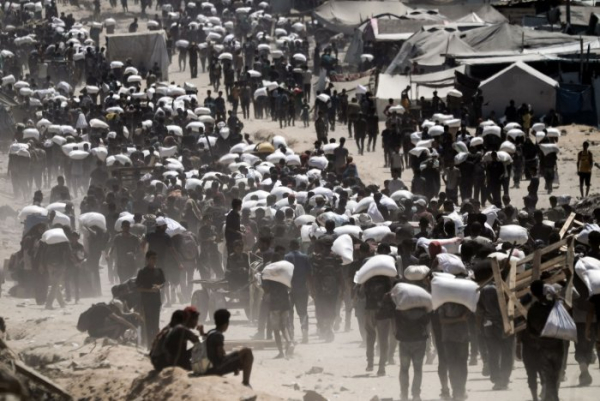Israel, U.S. boycott two-day meeting hosted by France and Saudi Arabia.


1 of 5 | Dignitaries attend a high-level international conference examining two states of Israel and Palestine in the Middle East. It took place at the United Nations headquarters in New York City on Monday. Photo by John Angelillo/UPI | License Photo
Government ministers from more than 100 countries on Monday gathered at the United Nations to consider a two-state solution to the Israel-Palestinian conflict.
The two-day conference, which is called the “Peaceful Settlement of the Question of Palestine and the Implementation of the two-State Solution” was delayed from June because of the war between Israel and Iran.
In remarks, U.N. Secretary-General Antonio Guterres said separate Israel and Palestine nations “remains the only framework rooted in international law, endorsed by this assembly, and supported by the international community.”
In December 2024, the U.N. General Assembly adopted a resolution backing two states.
Israel has been a U.N. member since May 11, 1949. Palestinians’ bid for full U.N. membership was vetoed by the United States in the 15-member Security Council in 2024. Ultimately, the 193-member General Assembly overwhelmingly upgraded Palestine’s rights as an observer state.
Israel and the United States are boycotting the two-day meeting hosted by France and Saudi Arabia. Israel, which was recognized as an independent state in 1948, has opposed separate states, and the United States sees no benefit in the summit
The issue is more pronounced since the war between Israel and Hamas when the militants invaded on Oct. 7, 2023. But the debate has been going on for decades.
French Foreign Minister Jean-Noel Barrot opened the conference and agreed with French President Emmanuel Macron’s commitment last week urging a “decisive step” toward resolving the conflict with separate nations.
“We must move from the end of the war in Gaza to the end of the entire conflict, which threatens regional stability,” Barrot said. “Only the two-state solution will meet the legitimate aspirations of both peoples. There is no alternative.”
Barrot said “concrete steps” include the official recognition of Palestine, normalized relations with Israel, Palestinian institutions reforms and Hamas disarmament.
Antonio Guterres then addressed the group.
“We are here today with our eyes wide open — fully aware of the challenges before us,” he said. “We know that the Israeli-Palestinian conflict has endured for generations — defying hopes … defying diplomacy … defying countless resolutions and defying international law. We know that the conflict continues to take lives, destroy futures, and destabilize the region and our world.”
But he said it can be resolved.
“That demands political will and courageous leadership,” he said. “And it demands truth. The truth is: We are at a breaking point. The two-state solution is farther than ever before.”
He noted the terror attacks by Hamas, Israeli hostages taken, the killing of tens of thousands of citizens and starvation in Gaza.
Guterres also described Israel’s “relentless expansion of settlements,” including in the West Bank and Israel’s Knesset declaration last week to annex the territory.
“They are part of a systemic reality that is dismantling the building blocks of peace in the Middle East,” he said. “And yet, precisely because of the grim realities, we must do even more to realize the two-state solution.
“Today’s conference is a rare and indispensable opportunity.”
He said it “it is the only credible path to a just and lasting peace between Israelis and Palestinians.”
Guterres added: “Specifically — Israel and Palestine — living side-by-side in peace and security, within secure and recognized borders, on the basis of the pre-1967 lines, with Jerusalem as the capital of both States — in line with international law, UN resolutions and other relevant agreements.”
During an address on April 25, Guterres warned “the promise of a two-state solution is at risk of vanishing altogether.”
Bob Rae, Canada’s ambassador to the U.N., said it is “not a peace conference.”
Before the summit, he told U.N. News: “It’s a way of trying to maintain the debate and get beyond the sticking points to the solutions. We hope there’ll be some listening, and we hope there’ll be some learning on the basis of what we hear.”
Israel, with a population of 9.8 million, including 7.2 million Jews, is surrounded by Arab nations: Egypt, Jordan, Lebanon, Syria and Saudi Arabia. And Palestinians include 2.2 million people on the Gaza Strip, and 3 million in the West Bank.
The idea for two states predates the U.N. founding in 1945.
In 1947, Britain’s mandate over Palestine ended with a U.N. partition plan in 1947 to divide the territory into Jewish and Arab states.
Israel accepted the plan but Arab nations declared war without the two-state solution implemented. Jordan took control of the West Bank and East Jerusalem, and Egypt had oversight of Gaza. In the 1967 Mideast war, Israel captured those territories.
Palestinians receive aid in Gaza

Palestinians carry sacks of flour after trucks with humanitarian aid entered through the Zikim crossing in northern Gaza on July 27, 2025. Photo by Mahmoud Issa/UPI | License Photo